Please find our most recent market review below. We hope these perspectives are valuable to you.
– The AdvicePeriod Team
Higher Rates for Longer?
Inflation concerns pushed stock prices down in September as 10-year Treasury yields continued their climb. Yields have been driven mostly by the strength of the U.S. economy and the prospect of inflation remaining stubbornly high. International stocks posted losses, led by China. Federal Reserve officials surprised markets by signaling interest rates won’t be cut as much as previously forecast.
Key Observations
- The S&P 500 lost nearly 5% in September, though the market is up more than 13% year to date.
- Small-cap and mid-cap stocks fell 5%-6% for the month.
- Bonds ended the month down about 2.5%.
- International developed and emerging markets fell 2%-3% in September.
Market Recap

The stock market had a rough month in September as technology stocks led the market lower, down 6.5% (as measured by the MSCI ACWI Information Technology Index). The S&P 500 lost about 4.8% during the month, though it is still up over 13% year to date, driven primarily by a more than 34% year-to-date gain in technology stocks. The Bloomberg U.S. Aggregate Bond Index was down about 2.5% for the month, while the 10-year Treasury yield increased. Yields on the 2-year Treasury rose in September, starting at 4.87% and rising to 5.05% on September 29. The 10-year Treasury yield increased from 4.17% to 4.58%. High-yield bonds were down 1.2%, outperforming core bonds. Small- and mid-cap stocks fell 5.9% and 5%, respectively. International markets ended the month with losses as the U.S. dollar rose.
Economic Growth Continues to Be Resilient
Hiring slowed this summer and unemployment rose in August, signs the labor market is cooling in the face of higher interest rates. The data from the latest jobs report suggests the Federal Reserve could raise rates again in November or December after keeping rates steady this month. Other data shows the broader economy remains strong, with consumer spending surging this summer and inflation easing. The unemployment rate was 3.8% in August, up from 3.5% in July—reflecting more Americans seeking work. Still, the job market remains tight enough that most employers are holding on to workers rather than laying them off.
Strong spending is encouraging economists to boost third-quarter growth projections. S&P Global Market Intelligence estimated that the U.S. economy is on track to grow at a 4% annual rate this quarter, nearly double the second quarter’s 2.1% pace. However, the recent payroll increases are far below the roughly 400,000 average monthly increases in 2022. Gains in the past three months were the worst since employers began consistently adding to payrolls in January 2021.
Consumer prices climbed in August at the fastest pace in more than a year due to a jump in energy costs. The Consumer Price Index rose 0.6% in August from the prior month, according to the Labor Department. More than half of the increase was due to higher gasoline prices. Core CPI, which excludes volatile food and energy prices, rose by a relatively mild 0.3% last month. On an annual basis, prices overall were up 3.7% in August versus 3.2% in July. Annual core inflation edged lower to 4.3% in August from 4.7% the prior month. Core inflation has shown a more significant slowdown when considering the three-month average. Core CPI over the three months ended August rose at a 2.4% annual rate, down from a 5% annual rate for the preceding three-month period.
Several factors could put upward pressure on prices in the coming months. Saudi Arabia’s decision to extend production cuts to its crude-oil output could keep gasoline prices elevated while a strike by the United Auto Workers Union could push up car prices on dealer lots.
Higher gasoline prices helped drive a 0.6% increase in total U.S. retail sales in August from the prior month while consumers modestly boosted their spending on other goods, according to the Commerce Department. Excluding gasoline, other sales at stores, online and at restaurants rose 0.2%.
Higher Rates for Longer?
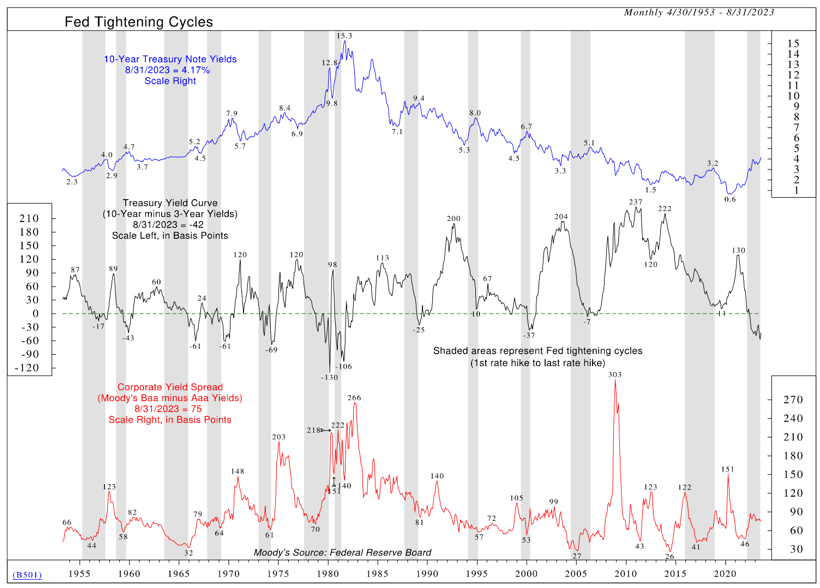
Source: Ned Davis Research. As of September 21, 2023.
Federal Reserve officials voted to hold interest rates steady at a 22-year high and revealed a divide over whether they should raise rates once more this year, with most leaning toward another increase. While the pause was expected, the Fed surprised markets by signaling interest rates won’t be cut as much as previously forecast. In their projections and commentary, some officials hinted that rates might be higher for longer. The Fed’s position helps explain why long-term Treasury yields have risen sharply in the past few months and why stocks are struggling.
Outlook
The mood on Wall Street changes very quickly, but, for most investors, their long-term goals remain unchanged. Traders are like a sailboat, adjusting each time the wind changes direction. But long-term investors are better off thinking like a battleship—staying the course no matter how difficult the conditions at sea. While the impressive gains in the stock market this year have been trimmed a bit, investors who stayed the course after last year’s bumpy ride have been well rewarded. Our advice remains the same: Stay disciplined, stick to your plan and stay focused on your long-term goals.
Disclosures:
This market commentary is meant for informational and educational purposes only and does not consider any individual personal considerations. As such, the information contained herein is not intended to be personal investment advice or recommendation. References to specific companies, asset classes, and financial markets are for illustrative purposes only. Diversification is an investment strategy designed to help manage risk but cannot ensure a profit or protect against loss in a declining market. Please consult a financial professional before making any financial-related decisions.
The commentary represents an assessment of the market environment through August 2023. The views and opinions expressed may change based on the market or other conditions. The forward-looking statements are based on certain assumptions, but there can be no assurance that forward-looking statements will materialize. This commentary was written and provided by an unaffiliated third party; we cannot guarantee the accuracy or completeness of any statements or data contained herein.
Indexes are unmanaged and cannot be directly invested into. Past performance is no indication of future results. Investing involves risk and the potential to lose principal.
AdvicePeriod is another business name and brand utilized by both Mariner, LLC and Mariner Platform Solutions, LLC, each of which is an SEC registered investment adviser. Registration of an investment adviser does not imply a certain level of skill or training. Each firm is in compliance with the current notice filing requirements imposed upon SEC registered investment advisers by those states in which each firm maintains clients. Each firm may only transact business in those states in which it is notice filed or qualifies for an exemption or exclusion from notice filing requirements. Any subsequent, direct communication by an advisor with a prospective client shall be conducted by a representative that is either registered or qualifies for an exemption or exclusion from registration in the state where the prospective client resides. For additional information about Mariner, LLC or Mariner Platform Solutions, LLC, including fees and services, please contact us utilizing the contact information provided herein or refer to the Investment Adviser Public Disclosure website (www.adviserinfo.sec.gov). Please read the disclosure statement carefully before you invest or send money.
For additional information as to which entity your adviser is registered as an investment adviser representative, please refer to the Investment Adviser Public Disclosure website (www.adviserinfo.sec.gov) or the Form ADV 2B provided to you. Investment adviser representatives of Mariner, LLC dba Mariner Wealth Advisors and dba AdvicePeriod are generally employed by Mariner Wealth Advisors, LLC. Investment adviser representatives of Mariner Platform Solutions, LLC dba AdvicePeriod, are independent contractors.
Index Definitions: The S&P 500 is a capitalization-weighted index designed to measure the performance of the broad domestic economy through changes in the aggregate market value of 500 stocks representing all major industries. Russell 2000 consists of the 2,000 smallest U.S. companies in the Russell 3000 index. MSCI EAFE is an equity index which captures large and mid-cap representation across Developed Markets countries around the world, excluding the U.S. and Canada. The index covers approximately 85% of the free float-adjusted market capitalization in each country. MSCI Emerging Markets captures large and mid-cap representation across Emerging Markets countries. The index covers approximately 85% of the free-float adjusted market capitalization in each country. Bloomberg U.S. Aggregate Index covers the U.S. investment grade fixed rate bond market, with index components for government and corporate securities, mortgage pass-through securities, and asset-backed securities. Bloomberg U.S. Corporate High Yield Index covers the universe of fixed rate, non-investment grade debt. Eurobonds and debt issues from countries designated as emerging markets (sovereign rating of Baa1/BBB+/BBB+ and below using the middle of Moody’s, S&P, and Fitch) are excluded, but Canadian and global bonds (SEC registered) of issuers in non-EMG countries are included. FTSE NAREIT Equity REITs Index contains all Equity REITs not designed as Timber REITs or Infrastructure REITs. Bloomberg Commodity Index is calculated on an excess return basis and reflects commodity futures price movements. The index rebalances annually weighted 2/3 by trading volume, and 1/3 by world production and weight-caps are applied at the commodity, sector, and group level for diversification. MSCI ACWI Information Technology Index includes large- and mid-cap securities across 23 Developed Markets (DM) countries and 24 Emerging Markets (EM) countries classified in Information Technology, as per the Global Industry Classification Standard (GICS®).
Does past performance matter?
Major Market Index Returns
Period Ending 10/1/2023
Multi-year returns are annualized.
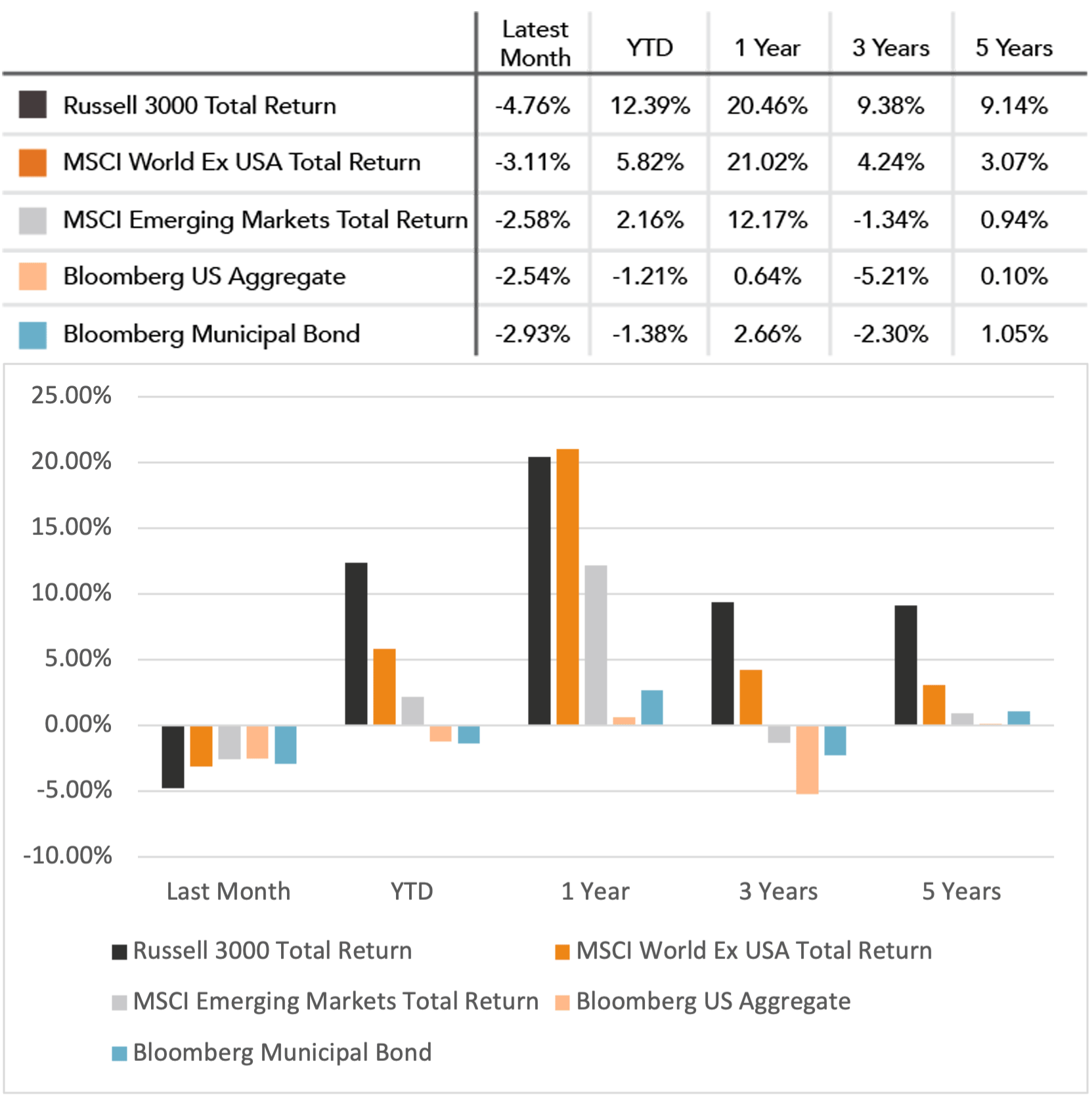
Mix Index Returns
Global Equity / US Taxable Bonds
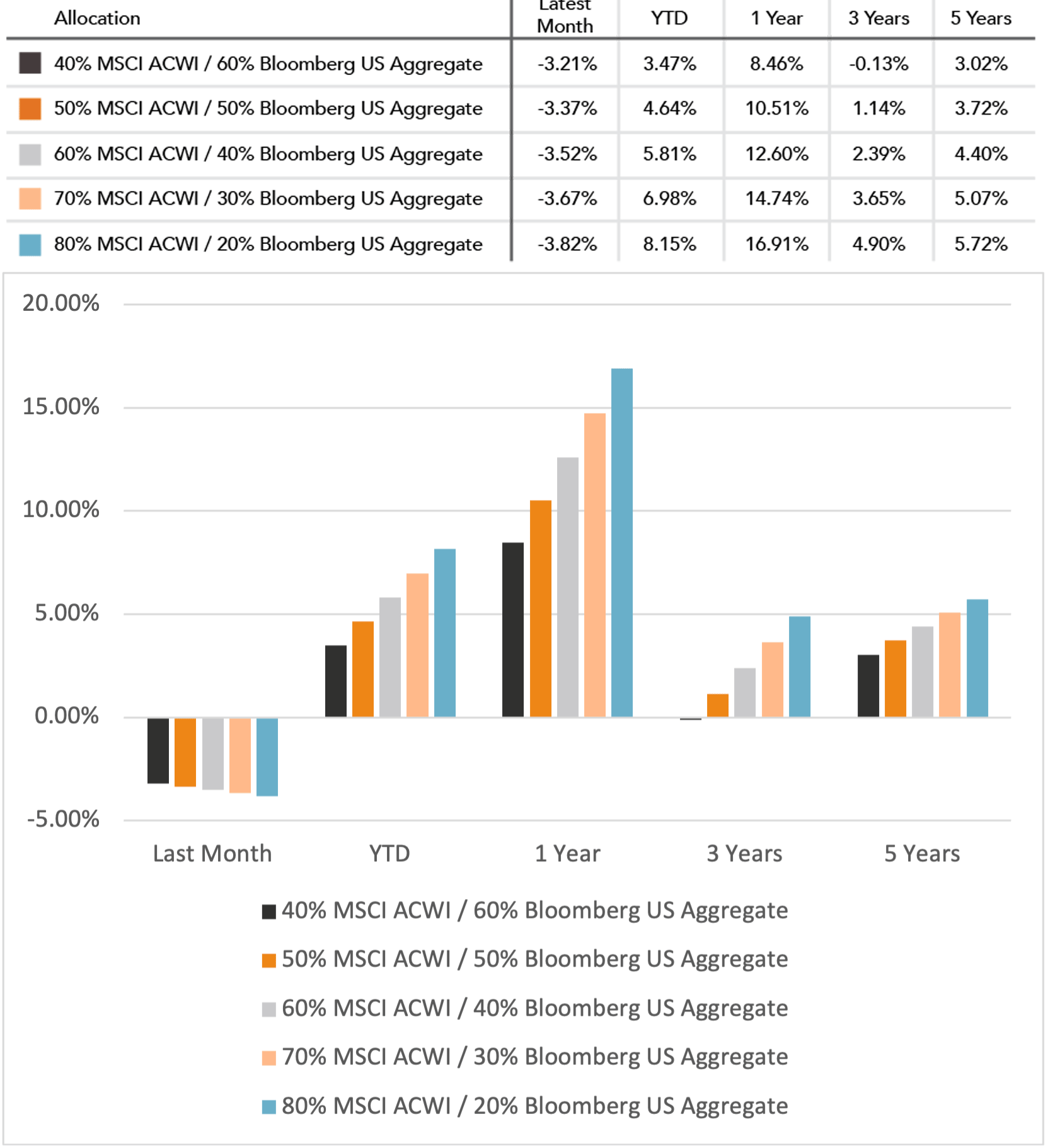
Indexes are unmanaged and cannot be directly invested into. Past performance is no indication of future results. Investing involves risk and the potential to lose principal.
The Russell 3000 Index is a United States market index that tracks the 3000 largest companies. MSCI Emerging Markets Index is a broad market cap-weighted Index showing the performance of equities across 23 emerging market countries defined as emerging markets by MSCI. MSCI ACWI ex-U.S. Index is a free-float adjusted market capitalization-weighted index that is designed to measure the equity market performance of developed and emerging markets excluding companies based in the United States. Bloomberg U.S. Aggregate Bond Index represents the investment-grade, U.S. dollar-denominated, fixed-rate taxable bond market, including Treasuries, government-related and corporate securities, as well as mortgage and asset-backed securities. Bloomberg Municipal Index is the US Municipal Index that covers the US dollar-denominated long-term tax-exempt bond market. The index has four main sectors: state and local general obligation bonds, revenue bonds, insured bonds, and prerefunded bonds.

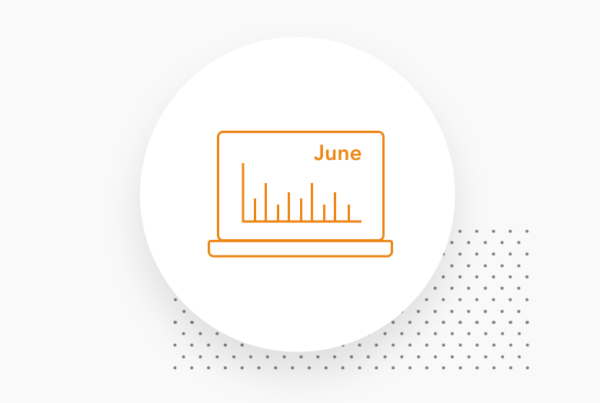
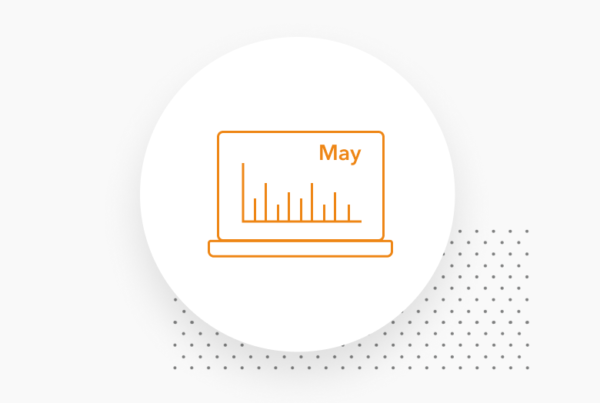

July 2024 Market Commentary